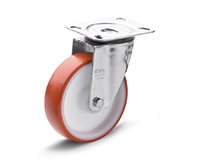How to Solve Common Problems with Cast Iron Wheels
Cast iron wheels are a popular choice for various industrial applications due to their durability and strength. However, like any mechanical component, they can encounter issues over time. Understanding these common problems and how to address them can ensure the longevity and efficiency of your equipment. In this blog, we’ll explore the typical issues associated with cast iron wheels and provide practical solutions.
-
Rust and Corrosion
Problem Overview
One of the most common problems faced by cast iron wheels is rust and corrosion, especially in environments exposed to moisture or chemicals. Rust not only weakens the integrity of the wheel but can also lead to operational failures.
Solution
To combat rust, regular maintenance is essential. Here are a few steps you can take:
– Inspection: Routinely inspect the wheels for any signs of rust. Early detection can prevent more severe damage.
– Cleaning: Use a wire brush to remove any rust that has developed. Follow this by cleaning the wheels with soapy water and drying them thoroughly.
– Protective Coatings: Apply a protective coating, such as rust-inhibiting paint or a clear sealant, to prevent moisture from contacting the iron surface.
-
Wear and Tear
Problem Overview
Over time, cast iron wheels can experience wear and tear from heavy loads and frequent movement. This can result in uneven surfaces and decreased performance.
Solution
To address wear and tear:
– Load Management: Ensure that the wheels are not overloaded beyond their specified weight limits. Check the manufacturer’s guidelines to avoid premature wear.
– Rotation: If your application allows, rotate the wheels periodically to distribute wear evenly across all wheels.
– Replacement: If a wheel is excessively worn, consider replacing it with a new one from reputable caster wheels manufacturers in India, who can provide high-quality replacements tailored to your needs.
-
Noise During Operation
Problem Overview
Cast iron wheels can produce noise during operation, which can be disruptive in certain environments. This noise often results from insufficient lubrication or debris caught in the wheel assembly.
Solution
To reduce operational noise:
– Lubrication: Regularly lubricate the bearings and axles of the wheels. Use a suitable lubricant that can withstand the conditions in which the wheels operate.
– Debris Removal: Inspect the wheels for debris that could cause noise. Clean out any accumulated dirt or materials that might interfere with smooth movement.
-
Poor Mobility
Problem Overview
Sometimes, cast iron wheels may not roll smoothly, which can hinder productivity and create safety hazards. This issue often arises from a lack of lubrication, wheel misalignment, or damaged bearings.
Solution
To enhance mobility:
– Alignment Check: Ensure that all wheels are properly aligned. Misalignment can cause dragging and resistance.
– Regular Maintenance: Keep the wheels clean and lubricated to promote smooth operation. Schedule regular maintenance checks to catch issues before they escalate.
– Bearing Replacement: If the bearings are damaged, replace them promptly to restore full mobility.
-
Cracking and Breakage
Problem Overview
While cast iron is strong, it is also brittle, making it susceptible to cracking or breaking under extreme conditions. This can occur due to impact from heavy loads or if the wheels are subjected to sudden changes in temperature.
Solution
To prevent cracking and breakage:
– Impact Prevention: Avoid sudden impacts or dropping heavy objects onto the wheels. Implementing a shock-absorbing mechanism can help mitigate this issue.
– Temperature Management: If your application involves extreme temperatures, consider using wheels designed to withstand those conditions. Consult with caster wheels manufacturers in India for suitable options.
-
Environmental Considerations
Problem Overview
The environment in which cast iron wheels operate can significantly affect their performance. For instance, exposure to harsh chemicals can lead to accelerated corrosion.
Solution
To minimize environmental impact:
– Choose the Right Wheel: Select wheels designed for specific environmental conditions, whether they be chemical-resistant or high-temperature options.
– Enclosures and Barriers: Where possible, create barriers or enclosures to protect the wheels from harsh environmental elements.
Conclusion
Cast iron wheels are an invaluable asset in various industrial applications, but they require regular maintenance and attention to prevent common issues. By understanding these problems and implementing the suggested solutions, you can enhance the performance and lifespan of your cast iron wheels. Whether you are managing a warehouse or operating machinery, a proactive approach to maintenance will ensure that your equipment runs smoothly and efficiently. For high-quality replacements or new installations, consider consulting reputable caster wheels manufacturers in India to find the best solutions for your needs.






